10 Best Dog Breeds for Emotional Support

Dogs are man’s best friend, and many of our furry companions share a bond with us like no other. Certain dog breeds exhibit particular skills or support, which make them ideal as emotional support animals.
We’ll look at the ten best breeds for emotional support (plus a few honorable mentions), as well as the specific criteria you’ll need to consider when picking the right emotional support dog for you.
But first, let’s examine two of the most important questions about emotional support animals.
What Is an Emotional Support Animal?
An emotional support animal is typically a dog or cat (though it can be a different animal) that helps those with anxiety, depression, phobias, or other emotional or mental health issues find comfort, support, and routine. Dogs don’t just make us feel warm and fuzzy inside because they’re cute; there’s a real science to it!
Our relationship with our dogs is incredibly special, and often allows us to free ourselves emotionally from some of the major stressors in our lives. Often, just having a companion to care for can provide a purpose in our lives that helps to get us up and out of bed every day, even when struggling from depression.
Additionally, the bond we share with our pets releases oxytocin in our brains, eliciting a chemical response that makes us happier and healthier. Many of us are afraid of being judged, and this fear can sometimes cause us to push people away. Dogs never judge you; they only wish to snuggle and play.
Many dogs can also provide a sense of overall security, even to those struggling from anxiety or phobias. The unconditional love from your dog is guaranteed to put a smile on your face at the end of a long hard day. Studies have even shown that petting and cuddling with your dog is scientifically proven to reduce stress hormones!
Where Can I Take an Emotional Support Animal?
A properly registered, well-trained emotional support animal is allowed in airline cabins with their owner, thanks to the Air Carrier Access Act (ACAA), as long as they meet the airline’s specific requirements. A registered emotional support animal must also be viewed as a “reasonable accommodation” in a housing unit, even when pets are not allowed.
Unlike service animals or psychiatric support animals, emotional support animals are not allowed in all public spaces or private businesses. However, you can still call ahead and ask to speak to management; if you’re polite, and inform them that your support animal is registered and well-trained, your dog may be allowed entry. Keep in mind though, they are not legally obligated to do this; the decision is up to the business.
The 10 Best Dog Breeds for Emotional Support
So, what breeds offer up the best emotional support? Every dog owner has a different set of needs and skills, so here are 10 of the best emotional support dogs you could adopt today.
1. Golden Retrievers

Golden retrievers are often referred to as the ideal emotional support dog, due to their advanced social skills and instant likeability. There is also a clear-cut reason why they are some of the most popular dogs in the world.
Retrievers are also relatively easy to train, making them ideal for those suffering from anxiety, as training your dog can often be a stress inducing task. Their even-tempered nature and calming demeanor make them easy to get along with, as well as especially comforting and grounding companions, and their social skills cause them to form loyal bonds with their caretakers rapidly.
If you’re in the market for a large emotional support dog that’s easy to train and incredibly low stress, you can’t miss with a golden retriever.
2. Labrador Retriever

Labs enjoy exploration, which is always a fun and relaxing experience to embark upon with your best friend. These dogs are guaranteed to get you up and out of the house to explore the neighborhood, which can be a massive mental boost to someone who is prone to staying in their home due to depression, anxiety, or phobias.
They do require some training however, unless you want everything in your house to quickly become a chew toy! However, their eagerness to please can make them good learners, though their hyper nature can require a fair amount of patience, especially if you get a lab that is younger than 5-years old; they tend to mellow out with age.
Labs have exceptional stamina and love to swim, so it is best to own one if you are able to explore the outdoors with your dog often, or if you live near a clean body of water. Like goldens, Labrador retrievers are a larger breed, weighing in at an average of 60-70 lbs, so if you’ve got the space to love and care for these dogs, they’ll be a perfect fit for your home.
3. Corgi

If you are in the market for a smaller dog, a Corgi may be just what you need. They are the Queen’s favored pup for a reason; Corgis tend to be highly intelligent and are therefore great emotional support companions, as they can easily be trained to perform needed tasks, like fetching a distracting stress toy for you when you’re having a panic attack. They are fairly independent though, so they may not be a great option for someone who isn’t experienced in training dogs.
Corgis do require a great deal of exercise, so you may want to steer clear of this breed if you aren’t very active — although they can be a great way to motivate you to get moving, which can help reduce symptoms of depression and anxiety. Don’t let their little legs fool you, these dogs love to zip around, and are known to require more than two walks per day, or at least a minimum of 45 minutes outdoors.
Corgis are also great guide dogs, as they were initially bred for herding purposes. So if you tend to find yourself disoriented when anxious or unsettled, you can train a corgi to help lead you where you need to go.
4. Yorkshire Terrier

Yorkshire Terriers are one of the most affectionate breeds around, making them a fantastic option for someone who is looking for a very comforting and cuddly emotional support dog. They require a great deal of love and care, which can provide a healthy and fulfilling outlet for many dog owners, especially those who feel isolated or who have a hard time connecting with others. Since they radiate so much love and affection to their owners, Yorkies are an ideal breed to owners trying to fight depression.
Additionally, their size makes them an ideal pet for apartment renters who may not have the same access to space as many homeowners. This also makes them easier to take with you on a plane, and may even make it more likely that some businesses will allow your dog entry.
Yorkies tend to keep a spritely and exuberant demeanor, which helps to quell anxiety in their owners and lift the moods of those around them. They’re also great with older children, making them a good option for a child who is dealing with depression or anxiety.
5. German Shepherd

Getting back to the larger breeds, we have the German shepherd. German shepherds are an intelligent and engaging breed. Often used as working dogs, they are at their best when given a set of tasks to fulfill. This can make them an excellent choice for an emotional support animal, as they’ll be eager to perform any needed tasks (even if it’s simply cuddling or pressing themselves against you for grounding purposes).
German shepherds are exceptionally protective, and they can be very motivational if you need a pick-me-up to get you moving and active for the day — a massive blessing if depression makes you feel like it’s impossible to get out of bed in the morning.
However, German shepherds don’t tend to bond instantly, and it can sometimes take a little bit of work to access their affectionate side. But once you get through, they are a fiercely loyal and endlessly loving breed, guaranteed to make your home a safer and more loving place.
6. Border Collie
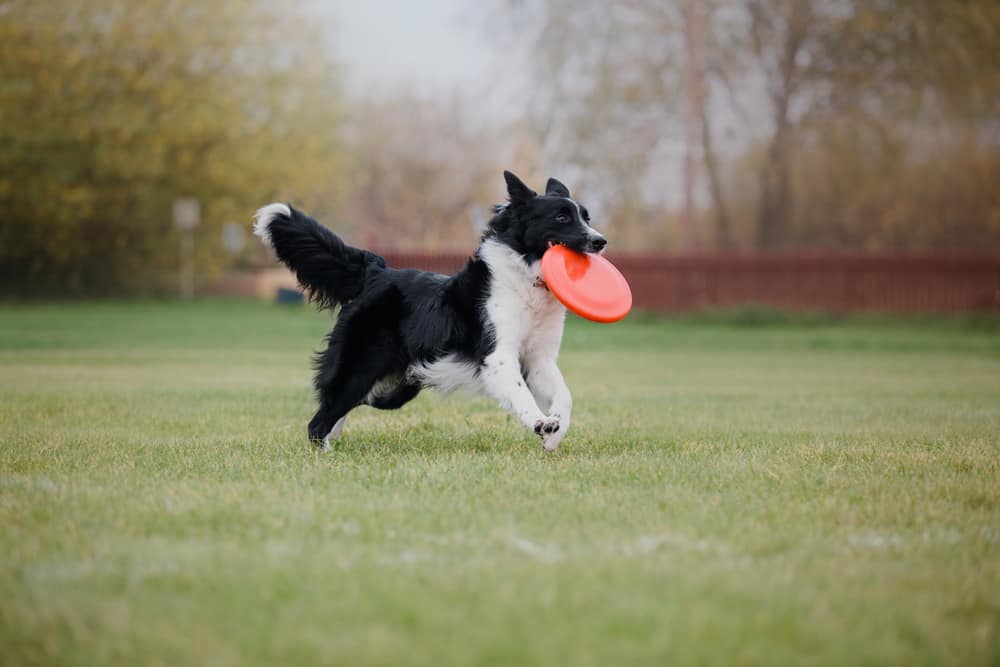
Collies are a very intuitive breed, often picking up nonverbal cues from their owners as a result of their shepherding, making them very adept at reading when their owner needs additional emotional support. Border collies are often referred to as the smartest breed in the world, making them easy to train. However, they are so intelligent that they can easily become bored, so you’ll want to make sure they continually have tasks to perform. Fortunately, if you need round-the-clock emotional support, this need-for-constant-work can make a border collie your perfect companion.
Border collies are known as “rescue dogs”, and are an ideal pet for owners struggling with PTSD due to their keen intuition with human sensitivities. They may even pick up on you experiencing symptoms before you’re aware of it yourself, and then help to ground you before the symptoms progress.
Border collies are often at their best around a loving family, and can sometimes be sheepish amongst strangers. But their bonds run deep, and their obedience and agility cause them to excel during complex training.
7. Greyhound
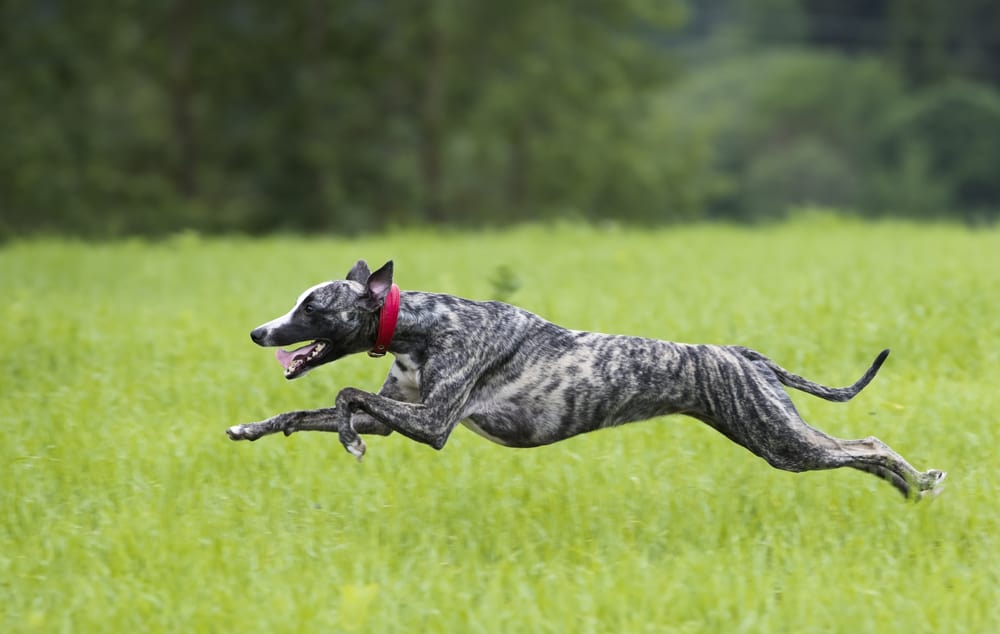
Greyhounds are highly sensitive, allowing you the ability to focus on caring for them, without even realizing how much they are inversely caring for you. They’re excellent at picking up on your emotions, so they can change their behavior to give you the type of comfort and support you may need in a given moment.
Greyhounds also tend to have longer lifespans than many other breeds, living to ages exceeding 15 years. This can make them a good option for someone struggling with depression, or with grief after a loss, since you’re likely to enjoy a long time together.
Greyhounds are a calm and caring breed, and require very little grooming, making them a great choice for someone with anxiety. The care routine of a greyhound is very simple, but they require a great deal of emotional availability as they can often experience nervousness around strangers. However, if you’re looking for an emotional support dog to shower with love, and get endless affection and support in return, a greyhound may be your perfect match.
Additionally, greyhounds require an exorbitant amount of exercise. It is advised to have a spacious yard as a greyhound owner as your dog will need some space to run around long after you have become exhausted.
8. Pomeranian
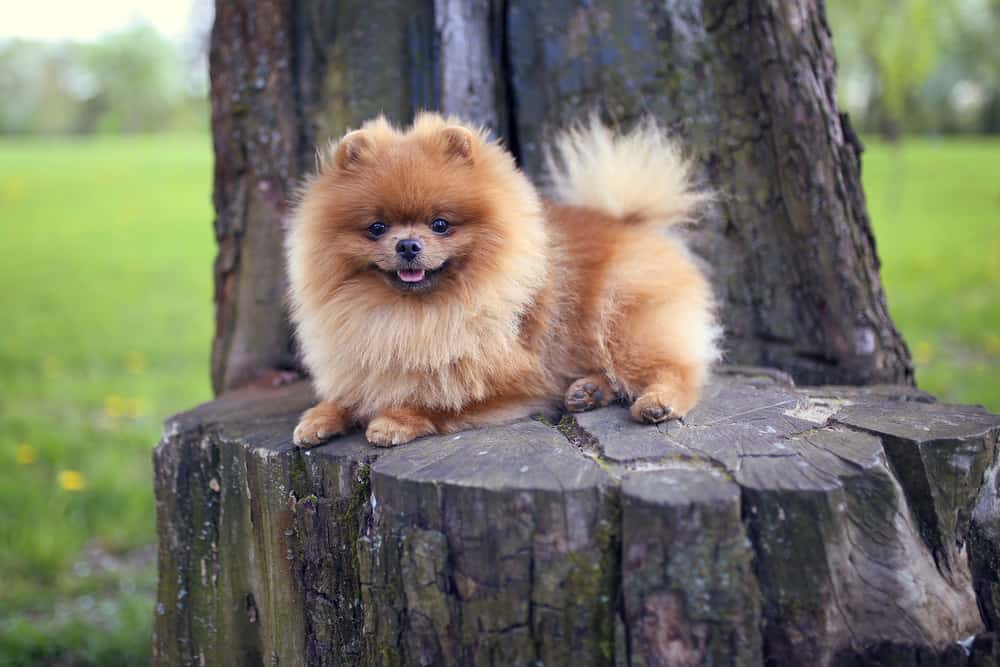
Pomeranians love affection, and can often be very needy, opting to stay close to their owners as much as possible. As a result, they are an intensely loyal breed, and can provide nearly constant emotional support to those who need it. They’re also exceptionally cute, which makes them a wonderful mood booster.
They have a maximum weight of under 10 pounds, making them the perfect lap dog to take anywhere. This almost means that you won’t have to struggle to control the dog, which can also help reduce anxiety.
Pomeranians tend to be loving and outgoing, and they form a strong bond with their human, which makes them ideal for owners struggling with anxiety or depression. If you’re looking for a deep, steady connection with your emotional support dog, a Pomeranian should be high on your list of options.
Pomeranians are known to be an incredibly smart and curious breed, which makes them good for training. However, they can sometimes be prone to excessive barking. So if sounds tend to set off your anxiety, this may not be the right breed for you.
9. American Pit Bull Terrier
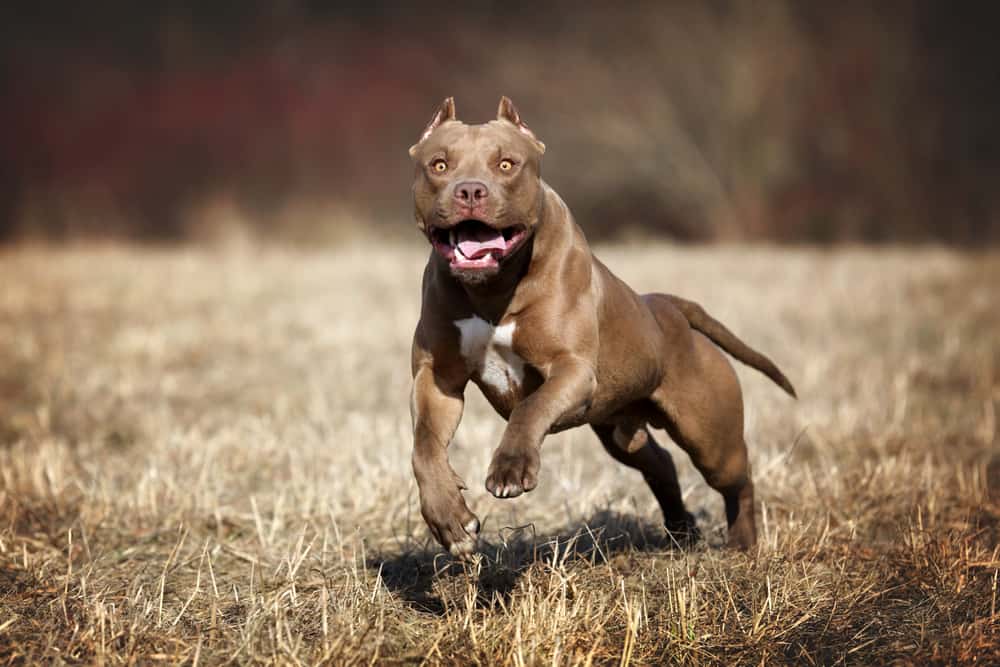
Pit bulls have been falsely labeled in recent years as a dangerous or aggressive breed. While it is true that some pit bulls have unfortunately been bred to fight with one another, their true nature lies in affection. When trained properly, a pit bull is an intensely caring and loving dog, and can be excellent at providing deep, loving, emotional support to their owner.
Unfortunately, due to the harmful stereotypes, you may have a bit of a PR problem if you adopt a pit. If confrontation is a trigger for you, this may be a challenging breed, since you may often have to defend your choice or explain that your dog is safe. However, if this isn’t an issue for you, then a pit bull’s loving nature can be more than worth this challenge.
They require proper training from a young age, but they are very smart, loyal, and sweet. They were once referred to as “Nanny dogs” as their caring nature was often used to care for small children. While it is of course irresponsible to leave a small child with any dog unattended, it just serves to prove that the proper training can make a pit bull an ideal source of comfort and care.
10. Poodle
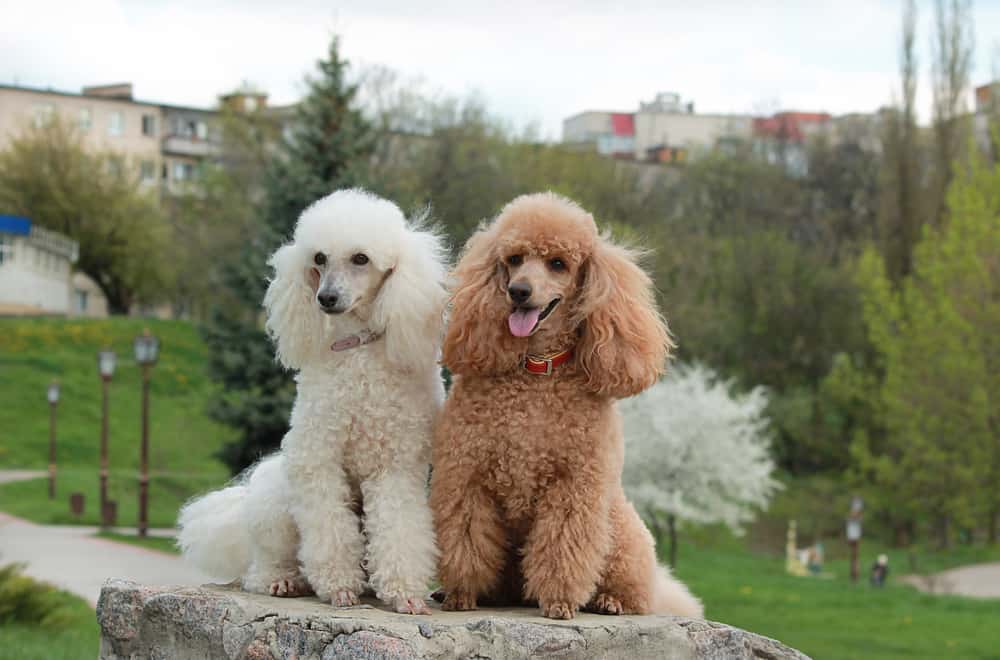
Poodles are obedient and easy to train, since they are highly intelligent. Like border collies, they are working dogs who love a challenge, so they’ll be more than up to any emotional support tasks. They also fare very well in the water, since they were initially bred as aquatic retrievers. So if heading to the shore helps reduce your anxiety, your poodle will happily come along.
If your roommate or family member is a cat lover, rejoice, as poodles can often be very friendly with other animals as well. This is also fantastic news if you also have a cat as an emotional support animal; there’s almost nothing more comforting than cuddling with a cat on your lap and a poodle by your side.
Poodles are very energetic and require a minimum of about 40 minutes of exercise per day, so be sure to have a nice walking path or a spacious yard if you wish to adopt one. Their need for exercise can be a great motivation to get you moving along with them, which can help improve your mental health and boost your mood.
Honorable Mentions
Do none of the top 10 listed above seem to scratch your canine itch quite right? We’ve taken the liberty of including a few honorable mentions that also have great emotional support qualities but exhibit major drawbacks which prevent them from being in the top 10.
11. Great Dane
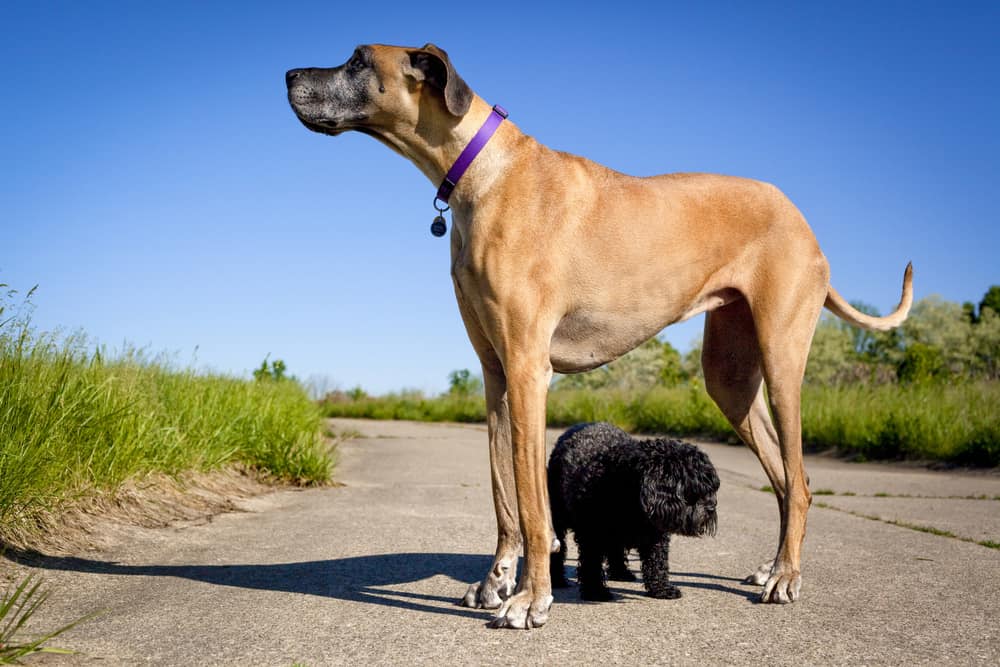
Great Danes are hulking creatures, often exceeding heights of 3 feet at the shoulder. However, their colossal stature does not prevent them from behaving like lap dogs. They often love to cuddle and be close to their owner, which can make them a great option for emotional support and grounding.
However, their size makes them exceptionally difficult to care for, and you may find trouble transporting them when necessary. But if you find that you have the adequate resources to care for a Great Dane, the affectionate and loving nature of these miniature horses make them ideal for those struggling with emotional support issues. They are also fiercely loyal and friendly, making them steadfast, comforting, and devoted companions.
12. Chihuahua

Chihuahuas have a big personality despite their miniature stature, and can be taken anywhere as a result of their teacup frame. This makes them a good choice if you like to need to carry your emotional support dog with you throughout the day, so you’ll have support whenever you need it.
However, they are often prone to excessive barking and yipping, and can also exhibit signs of aggression when not trained or socialized properly. So only choose them if you excel at dog training, aren’t intimidated by possible dog aggression, and don’t get set-off by sudden or persistent noises.
13. English Bulldog

English bulldogs have a sweet disposition and are extremely good with small children, making them good emotional support options if your children suffer from emotional issues. However, they require extensive training from a young age, making them a fairly stressful option compared to other breeds, especially for less-experienced dog owners.
Also, they do not have exceptionally long-life spans. The average age life expectancy of an English Bulldog is about 8-10 years, while other breeds can live for 15 years or longer. Overall, English Bulldogs are sweet and caring, but this short lifespan coupled with a difficult-to-train temperament can make them challenging for many.
14. Pug

A pug’s perpetually peeved appearance makes for an adorable presence around the house. Though they may appear to be fixed in a state of perpetual grouchiness, pugs are actually one of the most naturally positive breeds overall, helping to boost your mood even when depressed.
Pugs are also very high in energy, though they aren’t particularly agile or athletic. Most pugs desire no fewer than three walks per day, keeping their owners perpetually active and alert but without putting huge physical demands. If you love walking but hate running, or are trying to work up to gentle movement each day to help combat depression, a pug may just be the perfect emotional support dog for you.
Unfortunately, pugs often struggle in the heat, so they’re a better option for those in cooler climates. Also, many of them suffer from breathing problems, which can mean additional vet bills, as well as stress and worry.
15. Doberman Pinscher

Dobermans bond very tightly with their humans, which is why they make such effective guard dogs as well as emotional support animals. They’re highly trainable, but they require a great deal of socialization from a young age. If they are not socialized well enough, they may feel threatened too often, which can lead to a sense of heightened aggression.
This means a Doberman pinscher can be a great choice for someone experienced in dog training and who doesn’t find socialization an emotional challenge. But if that’s not you, then this breed may actually increase your anxiety and not give you the emotional support you need.
Other Important Considerations in an Emotional Support Dog
While all of the dog breeds listed above are generally good options for emotional support animals, you’ll want to choose a breed that works well for you specifically. To make sure you pick the right furry friend, keep these important factors in mind.
Choose a Dog Breed That Matches Your Lifestyle
When adopting a dog, it is imperative to research breeds in advance, to ensure you are providing a loving home to a dog whose care routine fits manageably within your lifestyle.
For instance, if you work outside of your home for hours each day or are not able to exercise with your pup frequently, you may need to ensure you don’t get a breed that requires a great deal of affection or exercise. If you live in a small apartment, you should be positive you don’t adopt a breed which requires a vast amount of space in order to be happy.
Nothing is more important in dog ownership than your newfound friend’s wellbeing and happiness. Your dog will bring you insurmountable joy, affection, and emotional support so long as you can provide it with the proper care they need.
Avoid Overly Independent or Clingy Breeds
When looking to adopt an emotional support animal, you likely want to avoid the more independent breeds such as the Shiba Inu, Siberian husky, and Jack Russel terriers, as they require less affection and don’t tend to mind being left to their own devices very often. This means they’re less likely to want to consistently provide you emotional support, and may even ignore you at times, which could heighten any negative feelings from depression or anxiety.
It may seem like a clingy dog would be the perfect breed for emotional support, but this isn’t always true. But dogs who exhibit a constant need for attention may increase anxiety, as you may feel worried about how they will fare emotionally if you need to be away from your home for extended periods of time. They may also make you feel pressure to support them constantly, as opposed to them supporting you.
It is important when researching breeds to find a happy medium that suits your lifestyle and emotional needs best.
Consider the Age of Your Emotional Support Dog
When choosing what breed to adopt, you should also consider the age of your new dog. Puppies tend to require a greater deal of care than older dogs, and also require training and support, which could increase your daily stress.
However, older dogs may have less time to spend overall in your life, and the loss of a dog may greatly exacerbate the very emotional turmoil you wish to quell. But older dogs often require less maintenance and can bring a calming sense of stillness and love into your home.
Think carefully about how much training you want to do, and how well you could handle losing a dog after only a few years. This will likely come down to your own personal emotional support needs, so think carefully about what feels best.
Think About What Size of Dog Is Right for You
The size of a dog can make a huge difference in how much they eat, how much physical effort they take to train or control, and how much space you need to keep them healthy and happy.
If you’re comfortable handling a large, strong dog, and have lots of indoor and outdoor space, a large dog may be perfect for you. They can also be good options if you need a large dog with substantial weight to ground you, by pressing up against you or lying on your chest, when you’re having a panic attack or a PTSD episode.
But if you live in a smaller apartment or don’t have access to lots of outdoor space, then a smaller dog may be the right choice. There are many advantages to adopting a smaller dog to keep in mind as well. Smaller dogs are often more cost effective as they eat less than a larger dog, and they can be taken to more locations where large dogs are not allowed. It is also recommended that first time dog owners adopt a smaller dog as they can often be easier to care for.
Be Mindful About Registration and Training
Additionally, be aware that there are a number of steps involved when registering your pup as an official emotional support animal. A registered emotional support dog must be highly trained, and they must exhibit a great deal of obedience and discipline. However, their emotional support can be well worth the extra effort.
Find Your Perfect Dog Breed for Emotional Support
Of course, every dog has their own unique personality, so it is important to get to know your pup personally before making judgments purely based on their breed. And remember that mixed breed dogs have as much love to give as any purebred.
Shopping by breed may have a number of advantages as you are more likely to find these specific traits exhibited, but many breeds also come with certain health issues specific to their kind. When looking for a new dog, be sure to weigh your options regarding breed types, and adopt what works best for you and your emotional support needs.




